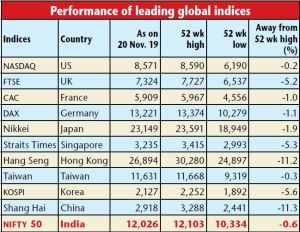
Markets to remain buoyant in the run up to budget
India’s economy is showing signs of stress as growth slowed to 5 per cent between April and June – its weakest pace since 2013. Moody’s has lowered India’s outlook to ‘negative’ from ‘stable’, affirming its foreign-currency and local-currency long-term issuer ratings at Baa2. Several agencies have downgraded India’s gdp growth for 2019-20 ranging 4.9-5.6 per cent. India’s economic outlook currently looks hazy.
On a positive note, the government has started taking cognizance of the slowdown and has announced big-bang measures – the biggest one being the cut in corporate tax rate. The tax cut has improved post-tax profitability of the corporates. The corporates are controlling costs and improving efficiencies. These measures are expected to add to profitability once the economy revives. India’s economy is in the process of bottoming out and a consensus expects it to turn around in 3QFY20. Investors have already started discounting future growth. Nifty50 has jumped from about 11000 levels to cross 12000 in anticipation of an economic turnaround. The broader markets, such as midcaps and small caps, are yet to participate in the current rally.
The government is struggling to meet its fiscal targets due to lower revenues due to economic slowdown and corporate tax cuts. It is also struggling to achieve its targeted proceeds from disinvestments. To meet this, it has announced its willingness to go ahead with the privatisation of public sector units by selling the entire government holding to the private sector. It has announced its intent to sell the government stake in BPCL and other PSUs by 31 March 2020. If this happens, it will be a huge sentiment booster for the markets.
The Supreme Court has directed telecom companies to pay their outstanding dues, which amount to about Rs 1.3 trillion, within three months. This will deteriorate the health of leading telecom operator, putting pressure on the banking system and also adversely impact revenue from the auction of 5G spectrum. In order to avoid this, the government is likely to provide a breather to companies for paying their dues. Major telecom operators have already announced hikes in tariffs, which should partly compensate for the ongoing financial stress.
The SC’s verdict on Essar Steel’s resolution through IBC partly compensates for the loss, as it will bring huge capital of about $7 billion back into the banking system. This ruling also provides clarity for a quick resolution of other IBC cases.
Investors expect the 2020 budget to be investor friendly, with more big-bang announcements pertaining to reduction in individual tax rates and also some relief through the removal of long-term capital gain taxes (LTCG). If these measures are implemented, it will result in huge re-rating for Indian equities. These expectations will continue to keep markets strong in the run up to the budget.
There is abundant liquidity in global markets, with most global indices quoting near 52-week highs.
With the US elections scheduled later in 2020, President Trump could announce measures to keep the strong momentum going in the run-up to the elections. There are signs of resolution to the US – China trade war, as both countries are seen as softening their stand. The resolution should create huge momentum for global equities. The US Fed has already announced monetary easing by way of purchase of treasury bills. Markets are also anticipating a stimulus package from China after the Chinese central bank cut its short-term funding rate for the first time since 2015.
FIIs, which were net sellers in 2QFY20, have started buying into Indian equities, investing about Rs26,000 crore since the beginning of October 2019. Crude, which was looking fiery hot in 2018 as also in the first half of 2019, has remained range-bound. This is a huge positive for an oil-importing country like India. On the back of these developments, Indian markets are expected to remain buoyant in the run up to the budget. Post-budget, corporate earnings for 3Q-FY20 should dictate the trend.
This article is to be originally published in Business India Magazine.
Write to us at news@valuelineadvisors.com
Disclaimer: The views expressed in this article are personal and the author is not responsible in any manner for the use which might be made of the above information. None of the contents make any recommendation to buy, sell or hold any security and should not be construed as offering investment advice.
